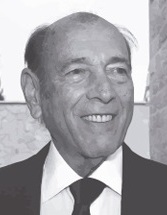Israel Klabin | |
|---|---|
 | |
| 2nd Mayor of Rio de Janeiro | |
| In office 15 March 1979 –3 June 1980 | |
| Preceded by | Marcos Tamoio |
| Succeeded by | Júlio Coutinho |
| Personal details | |
| Born | 20 September 1926 |
| Political party | Brazilian Democratic Movement |
| Spouse(s) | Lina Caldas Paranhos (m. 1950;div. 1960)Léa Manela (m. 1975) |
| Occupation | Civil engineer, mathematician, environmentalist, politician |
Israel Klabin (born 20 September 1926) is a Brazilian civil engineer, mathematician, environmentalist and politician. He was born in Rio de Janeiro. [1] He served as the second Mayor of Rio de Janeiro from 15 March 1979 to 3 June 1980. He was a member of the Brazilian Democratic Movement. [2]
Contents
After serving as mayor, Klabin was President of the State Bank of Rio de Janeiro from 1980 to 1983.